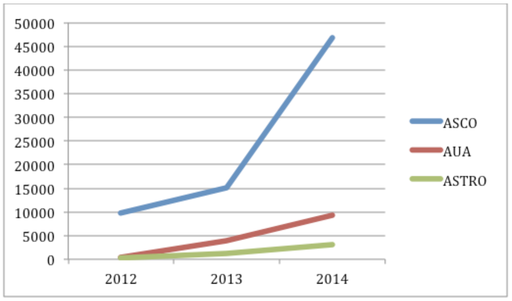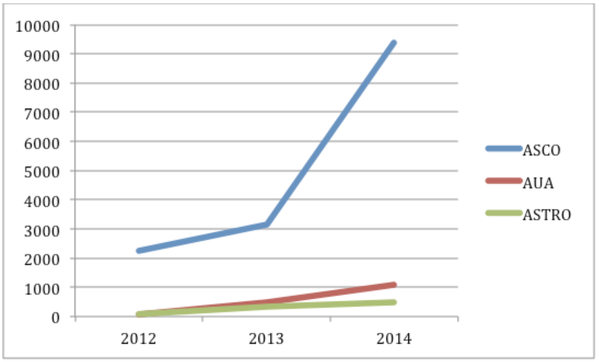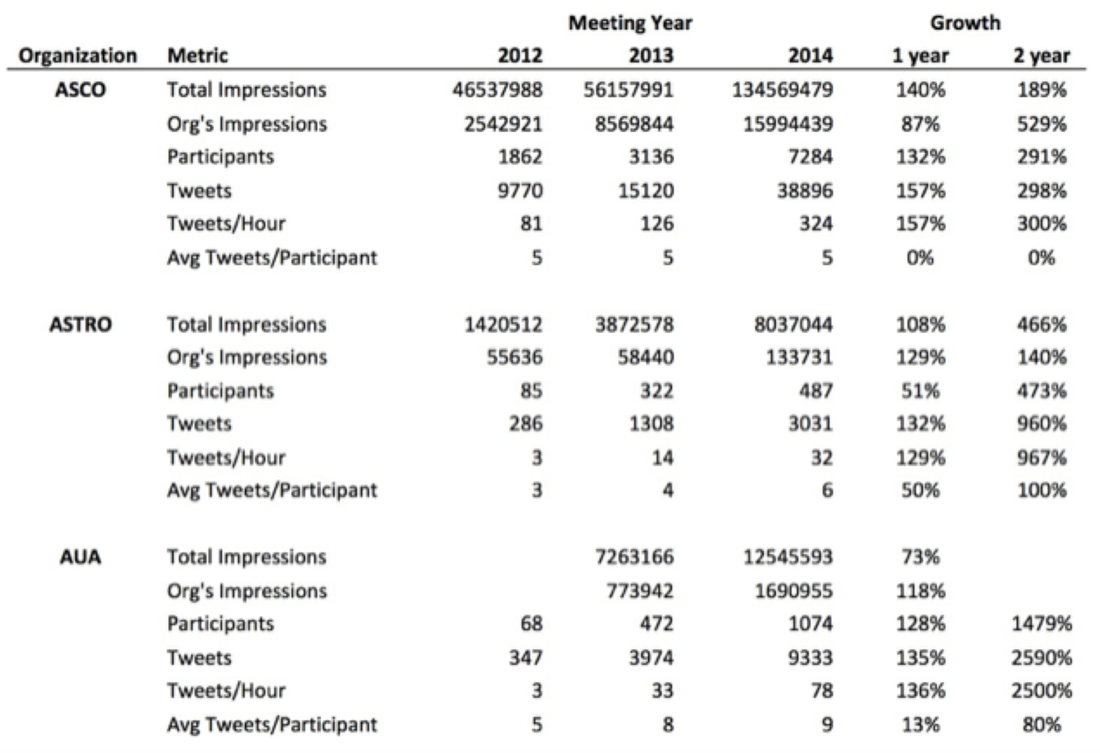Originally posted on the Mayo Clinic Center for Social Media, November 24, 2014
Last year, I wrote about differences in how professional societies use social media during annual meetings. This year, the American Urological Association (AUA), American Society of Clinical Oncology (ASCO) and American Society for Radiation Oncology (ASTRO) have had their meetings, so it’s time to take another look. Looks like the growth trend continues for sharing research and specialty-specific information in cancer care via social media.
Using Symplur’s hashtag analytics, I reviewed Twitter data for ASCO and ASTRO annual meetings from 2012 through 2014. I chose to include one week before and two weeks after the meeting since discussion typically extends beyond face-to-face conferences.
Symplur had data for #AUA13 and #AUA14. #URO12 wasn’t in Symplur so I reviewed it manually on Twitter.
Last year, I wrote about differences in how professional societies use social media during annual meetings. This year, the American Urological Association (AUA), American Society of Clinical Oncology (ASCO) and American Society for Radiation Oncology (ASTRO) have had their meetings, so it’s time to take another look. Looks like the growth trend continues for sharing research and specialty-specific information in cancer care via social media.
Using Symplur’s hashtag analytics, I reviewed Twitter data for ASCO and ASTRO annual meetings from 2012 through 2014. I chose to include one week before and two weeks after the meeting since discussion typically extends beyond face-to-face conferences.
Symplur had data for #AUA13 and #AUA14. #URO12 wasn’t in Symplur so I reviewed it manually on Twitter.
Fig. 1. Tweets for ASCO, AUA, and ASTRO from week before to two weeks after annual meeting. (2012-2014)
ASCO, which has been ahead of the pack for professional societies using social media, has shown continued strong growth in using Twitter. The increase in tweets mirror the increasing number of participants:
ASCO, which has been ahead of the pack for professional societies using social media, has shown continued strong growth in using Twitter. The increase in tweets mirror the increasing number of participants:
Fig. 2. Participants tweeting from week before to two weeks after annual meeting. ASCO, AUA and ASTRO
On an absolute scale, ASCO is the leader, but note that it has been strategically using social media longer than either AUA or ASTRO. And how are those organizations doing based upon growth rates? Pretty well.
On an absolute scale, ASCO is the leader, but note that it has been strategically using social media longer than either AUA or ASTRO. And how are those organizations doing based upon growth rates? Pretty well.
Table 1. Social media metrics, 2012-2014.
AUA used #URO12 because a competing meeting was already using #AUA12, but #URO12 apparently wasn't intuitive enough. Meanwhile, ASTRO appears to be lagging approximately one year behind AUA in most measures. Both organizations’ meetings had an increasing number of tweets per participant. ASCO’s Twitter use has been flat.
To what extent do the organizations themselves play a role in advocating Twitter activity?
ASCO, ASTRO and AUA have all grown their online presence with Twitter. But ASTRO hasn't been as proactively tweeting at its own meeting as either ASCO or AUA.
In 2014, ASTRO had only 35 tweets using the meeting’s hashtag vs. 754 and 381 for ASCO and AUA, respectively. So far that doesn't appear to be hurting ASTRO’s growth in using its annual meeting hashtag. But is organizational engagement needed to sustain that growth, or are people going to increasingly use Twitter on their own?
ASCO is a very large organization with over 34,000 members, so I wouldn't expect either AUA or ASTRO to reach quite the same level of participation. But both urology and radiation oncology appear to be on the same path – sharing more cancer information online.
So, is sharing at academic meetings trending good, bad or meh? Should organizations proactively lead tweeting during meetings? Should organizations let this grassroots process be initiated by meeting participants? I’d love to know what you think.
AUA used #URO12 because a competing meeting was already using #AUA12, but #URO12 apparently wasn't intuitive enough. Meanwhile, ASTRO appears to be lagging approximately one year behind AUA in most measures. Both organizations’ meetings had an increasing number of tweets per participant. ASCO’s Twitter use has been flat.
To what extent do the organizations themselves play a role in advocating Twitter activity?
ASCO, ASTRO and AUA have all grown their online presence with Twitter. But ASTRO hasn't been as proactively tweeting at its own meeting as either ASCO or AUA.
In 2014, ASTRO had only 35 tweets using the meeting’s hashtag vs. 754 and 381 for ASCO and AUA, respectively. So far that doesn't appear to be hurting ASTRO’s growth in using its annual meeting hashtag. But is organizational engagement needed to sustain that growth, or are people going to increasingly use Twitter on their own?
ASCO is a very large organization with over 34,000 members, so I wouldn't expect either AUA or ASTRO to reach quite the same level of participation. But both urology and radiation oncology appear to be on the same path – sharing more cancer information online.
So, is sharing at academic meetings trending good, bad or meh? Should organizations proactively lead tweeting during meetings? Should organizations let this grassroots process be initiated by meeting participants? I’d love to know what you think.



 RSS Feed
RSS Feed